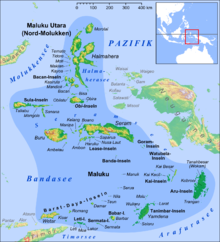Train hijacking in Wijster

The train kidnapping in Wijster was a hostage-taking that took place on December 2, 1975 near the village of Wijster in what is now the municipality of Midden-Drenthe in the Dutch province of Drenthe . Responsible for the act were radicalized young people who belonged to the Moluccan minority in the Netherlands . Three hostages died in the train hijacking.
background
In the 1970s there was a radicalization of many Moluccas living in the Netherlands. This was expressed in a series of acts of violence in the Netherlands. One reason for the radicalization of the Moluccan population was the failed attempt to establish a Moluccan state. In 1950 the Republic of Maluku Selatan was proclaimed. This state comprised 150 islands of the Moluccas and had a population of around 1 million people. Five years after the founding of the state, it was finally taken by Indonesian troops, so that the southern Moluccas de facto belonged to Indonesia. From exile in the Netherlands , a government under Johan Manusama continued its work and tried to establish the Moluccan state after all. The political demands of the Moluccan minority and the government-in-exile were to be given greater weight through hostage-taking. This government-in-exile still exists today, although the Moluccas belong entirely to the state of Indonesia. There are still radical Moluccan groups in the Netherlands who use violence and terror to advocate for an independent Moluccan state.
Carrying out the act
The train that was kidnapped by Moluccan youths on December 2nd, 1975, was a regional train that ran from Groningen to Zwolle . In the village of Wijster, which is south of Groningen and northeast of Zwolle, about halfway between the cities, the perpetrators pulled the emergency brake and took control of the stationary train. At the beginning of the hostage situation, the train driver was shot. Two other hostages were murdered because the hostage takers' demands, they believed, were not being implemented quickly enough.
Occupation of the Indonesian consulate
Another group of Moluccan youth supported the train hijackers' demands by taking control of the Indonesian consulate in Amsterdam on December 4, 1975 . The occupation ended on December 19, 1975 after the train hijacking also ended. A person died in the action.
Demands of the hostage takers
The following conditions were attached to the Dutch state if the hostages were to be released:
- the release of all Moluccas imprisoned in the Netherlands
- a conversation between Johan Manusama , the President of the government-in-exile of the Republic of Maluku Selatan, and the Indonesian President Suharto
- a conversation between Manusama and the Dutch government to recognize the Republic of Maluku Selatan
- a bus that takes the hostage-takers to Schiphol Airport , from where they are allowed to leave the Netherlands
End of the hostage situation
On December 14, 1975, the hostage situation ended after 13 days. The reason for the end of the hostage-taking was the wounding of a hostage-taker by a dud and the initiation of talks with the Dutch state through Moluccan negotiators.
The kidnappers were sentenced to 14 years in prison in 1976. The most fanatical hostage-taker, Eli Hahury, who killed two of the hostages, committed suicide in 1978 in Winschoten prison .
consequences
On January 17, 1976, the first talks between the Dutch government and the government in exile led by Johan Manusama took place. On the initiative of the Dutch Prime Minister Joop den Uyl , the South Moluccan -Dutch Advisory Commission was founded , in which five representatives each from the Netherlands and the Moluccan minority were represented. in June 1978 the Commission presented its final report . The content of the report was rejected by Manusama. He withdrew his representatives from the commission, so that in July 1978 it was already dissolved. The Dutch government did not recognize the Republic of Maluku Selatan, but it did promote the cultural identity of the Moluccan minority in the Netherlands. In return, the Moluccas should accept the Dutch values and rules. In the areas of education and work, the Dutch government promoted the integration of the Moluccas, for example through the recruitment of teachers in schools who were specifically supposed to work with Moluccan children and young people, and the opening of the civil service to Moluccans.
See also
Individual evidence
- ↑ South Moluccas, Indonesia. Retrieved July 16, 2017 .
- ↑ Moluccans in exile threaten with violence. In: The world. Retrieved July 16, 2017 .
- ↑ Google Maps. Retrieved July 16, 2017 .
- ↑ a b c Westfälische Wilhelms-Universität Münster, NetherlandsNet: NetherlandsNet - Social - Moluccas - Train hijacking and hostage taking - Escalation of violence in the mid-seventies. Retrieved July 16, 2017 .
- ^ Eva Oberloskamp: Code name TREVI . S. 123 .
- ↑ Westfälische Wilhelms-Universität Münster, NetherlandsNet: NetherlandsNet - Terrorism and Counter Terrorism - Actions of the Moluccas. Retrieved July 16, 2017 .
- ↑ Westfälische Wilhelms-Universität Münster, NetherlandsNet: NetherlandsNet - Social - Moluccas - Becoming aware of the situation? - Commissie Köbben-Mantouw and Molukkersnota. Retrieved July 16, 2017 .
Coordinates: 52 ° 47 ′ 50 ″ N , 6 ° 30 ′ 1 ″ E

